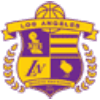With the 2016 NBA Draft less than two weeks away, fans of the Los Angeles Lakers are anxiously waiting to see who the team selects in the first round. While hoping for the number one choice, they were still happy and relieved when the team ended up with number two, as they could easily have lost their first round pick entirely if they had fallen out of the top three.
Given that the experts say there are two equally outstanding players in this year’s draft, in the end, it didn’t matter whether the Lakers chose number one or number two. Or did it?

It seems that every year two players are vying to be chosen number one, players who pundits believe stand apart from the rest of the potential draftees. Last year, it was Karl-Anthony Towns vs. Jahlil Okafor, with Towns winning the competition (somehow D’Angelo Russell snuck past Okafor at the last moment for the number two pick). The year before, it was Andrew Wiggins vs. Jabari Parker, with Wiggins the winner.
This year, the competition is between Ben Simmons of LSU and Brandon Ingram of Duke. Ingram, after making a positive impression at the draft combine last month, just finished his pre-draft workout and interview with the Lakers and will do the same with the Philadelphia 76ers, holder of the first choice in this year’s draft. While Ingram has been very visible, Simmons has kept to himself and did not attend the combine. He has not met or worked out for any team and reportedly has nothing scheduled.
The conventional wisdom is that Simmons and Ingram, though possessing different skill sets are comparable to one another, so for the Lakers, it doesn’t matter which player falls to them at number two. If history is any indication, it makes an enormous difference. Historically, players chosen number one have consistently excelled in the NBA while players chosen second overall have not.

The Lakers have drafted number one three times in their history. When they selected Elgin Baylor first in the 1958 NBA Draft, the team immediately went from last place the year before to playing in the NBA Finals in Baylor’s rookie season. In Magic Johnson’s rookie season in 1979-80, the Lakers not only played in the Finals, but they also won. In 1982, the team made James Worthy their third and final number one draft choice. Like Johnson and Baylor, he became a Hall of Fame player.
Fast forward to the present, in ten of the last 13 drafts, the player chosen number one went on to stardom or superstardom. This includes, in addition to Towns and Wiggins, Anthony Davis (2012), Kyrie Irving (2011), John Wall (2010), Blake Griffin (2009), Derrick Rose (2008), Andrew Bogut (2005), Dwight Howard (2004), and LeBron James (2003). Six of these players earned NBA Rookie of the Year honors.
During this span, the only players chosen number one who did not work out were Anthony Bennett in 2013, Greg Oden in 2007, and Andrea Bargnani in 2006. In Oden’s defense, his career was ruined by injuries or it is likely he would have excelled.

In the same period, players chosen number two in the draft did not fare nearly as well, and in many cases not well at all. The only stars among the group are Kevin Durant (2007) and LaMarcus Aldridge (2006). The only Rookie of the Year award winners were Durant and Emeka Okafor (2004).
Among the lesser distinguished number two selections from 2003 to the present are Darko Milicic (2003), Marvin Williams (2005), Michael Beasley (2008), Hasheem Thabeet (2009), and Derrick Williams (2011). The others are, at present, average or slightly above average, players like Russell (2015), Parker (2014), Victor Oladipo (2013), Michael Kidd-Gilchrist (2012), and Evan Turner (2010).
There is a huge difference between these two lists. The conclusion to be drawn from history is that, while there are no guarantees either way, players chosen number one in the draft usually go on to become top players in the league while players selected second overall do not.

Of course, top tier talent can come from anywhere in the draft. For example, in 2012, Anthony Davis was beaten out for the Rookie of the Year award by Damian Lillard, drafted number six. Lillard plays in relative obscurity for the Portland Trail Blazers, but talent-wise, as anyone who has watched him play against the Lakers the past few seasons knows, he is one of the top point guards in the league. The year before, Jordan Clarkson, a mid-second round selection, far outplayed guards chosen in the lottery such as Marcus Smart and Dante Exum, en-route to a coveted spot on the NBA All-Rookie First Team.
This brings the discussion back to Simmons and Ingram. Most experts feel that both are can’t-miss prospects, though, in an age where everyone is critiqued to death, some have pronounced that Simmons can’t shoot, and Ingram is too skinny. Still, the Lakers are in a very easy position. They don’t have to agonize between the two, or worry about making the wrong choice, as that burden falls entirely on the 76ers.

Yet, history suggests that the player chosen number one will become a superstar while the player selected number two will not. For the sake of the Lakers, let’s hope this year is the exception, and that experts who see Simmons as the next LeBron James and Ingram as the next Kevin Durant are right. If this turns out to be the case, the Lakers, and their fans will be winners either way.




